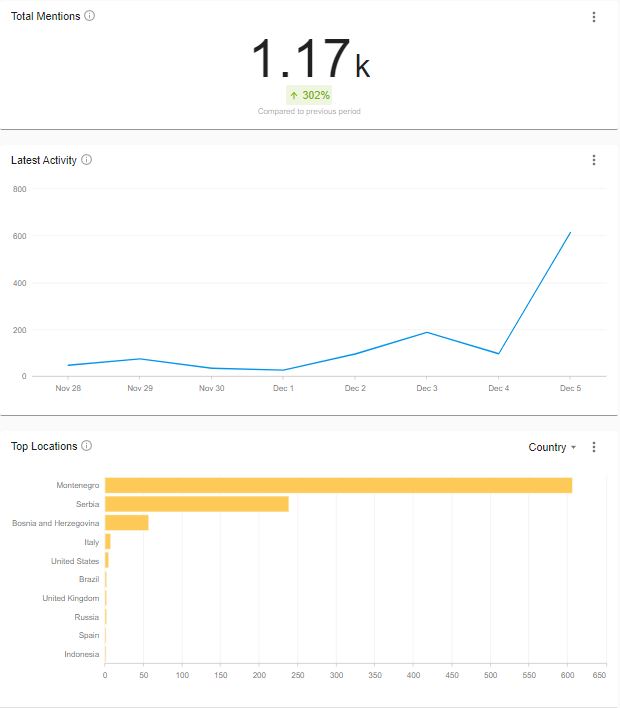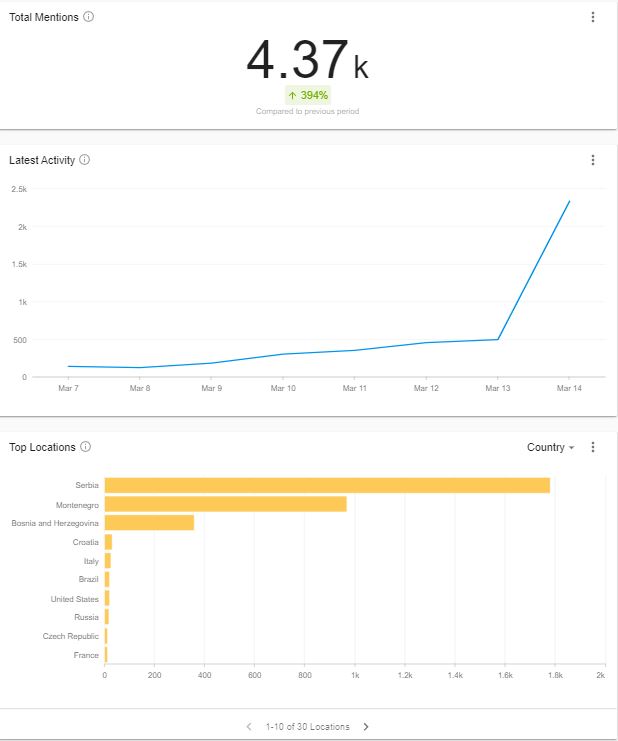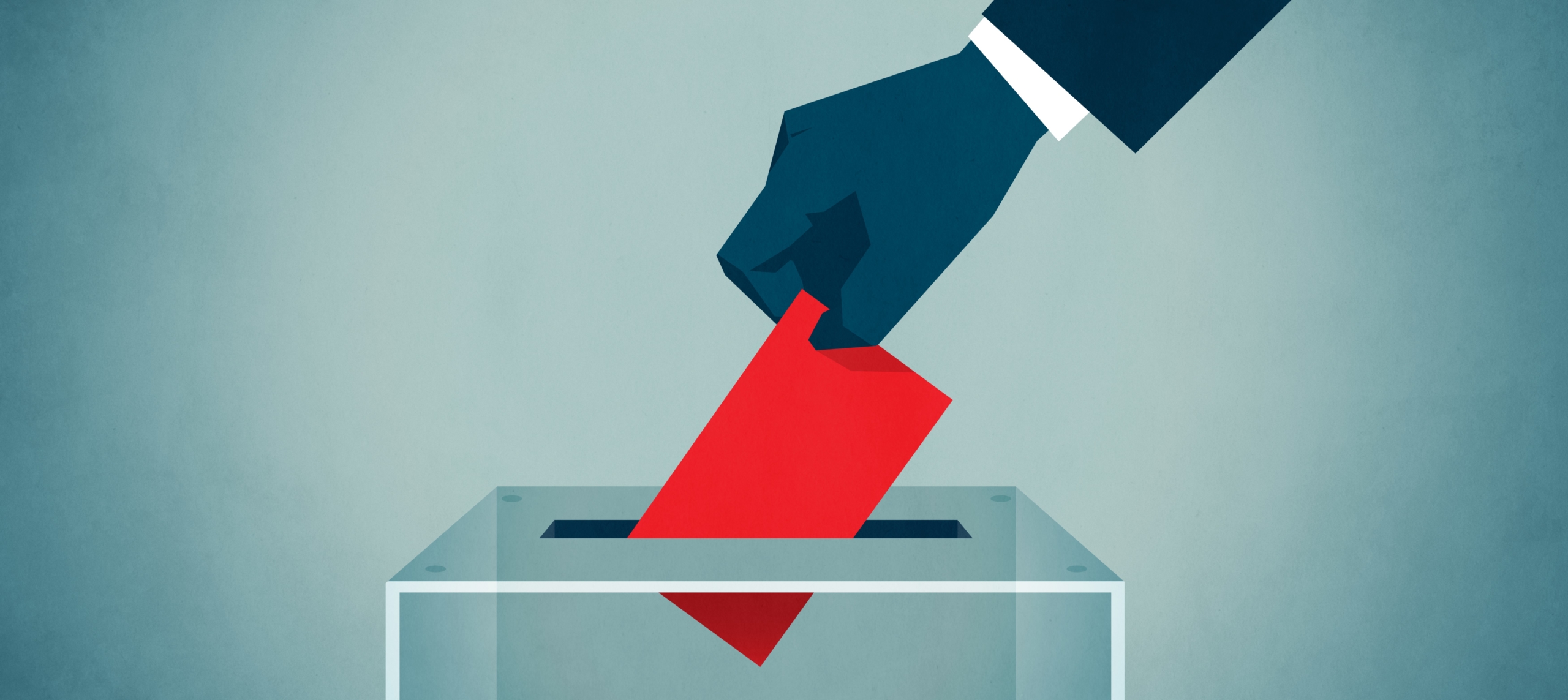Local elections in Montenegro, held in three municipalities – Cetinje, Mojkovac, and Petnjica on December 5, 2021, were organized during the political and institutional crisis in the country. Disagreements between the greatest part of the parliamentary majority (the Democratic Front and the Socialist People’s Party) and the Government continued, and all attempts to reconstruct it were unsuccessful. The Democratic Front determined December 10 as a deadline for a new agreement between the constituents of the parliamentary majority and then proposed returning the mandate to the citizens and organizing new elections. In the same period, the opposition raised in Parliament the issue of trust in the Government, a move that has since been withdrawn from the parliamentary procedure. As the reconstruction has not taken place yet, Prime Minister Zdravko Krivokapic will continue to lead the executive branch of government in the coming period.
The rather perplexing situation on the Montenegrin political scene also had an impact on the local elections. Only after the end of the local elections did the Parliament elect a new Chair of the State Election Commission (the previous Chair of the SEC was dismissed by the parliamentary majority in June), which undoubtedly negatively affected the democratic character of the elections. Without the SEC Chair, any election appeal process is completely paralyzed. Also, due to disagreements within the parliamentary majority, certain non-governmental organizations in charge of monitoring the elections in Montenegro were not able to do so this time as well.
Although the local elections in Cetinje, Mojkovac, and Petnjica were held at an important political moment for Montenegro, the election campaign, as well as the election day itself passed quite peacefully and without tensions. Also, neither strong media campaign was initiated, nor a campaign on social networks. However, it should be emphasized that there was no visible foreign interference during these elections, which we witnessed during the parliamentary elections in 2020 and the local elections in Niksic in 2021.
Disinterest of the media from Serbia
While the elections in Niksic were marked to be of historical significance, the local elections in Cetinje, Mojkovac, and Petnjica were not characterized in a similar way either in the days before or after the elections. Moreover, the presence in the media and on social networks was much lower than in the case of the elections in Niksic, in March 2021. In the pre-election campaign in Niksic, the Serbian media were at the forefront. Headlines on portals often had a tendentious note, with frequent sensationalist posts, as well as fake news and disinformation. This time, neither the Serbian media nor the regular activists on social networks cared much.
According to data released by the Digital Forensic Center (DFC) on February 14 ahead of the local elections in Niksic, there were over 1,000 election-related announcements in just one week. For the sake of comparison, almost a month before the elections, the media, and users of social networks published over 1,000 announcements on a weekly basis. For the December 5 elections, a month before election day, about 200 announcements were made weekly.
As many as 1,000 announcements were reached just a week before the elections in Cetinje, Mojkovac, and Petnjica, including the election day. For the sake of comparison, a week before the elections in Niksic, there were over 4,000 announcements that were directly related to the elections. An important difference is in the fact that before and during the elections in Niksic, most announcements were from Serbia, while for the recent elections in the three mentioned municipalities, most information was from Montenegro, as shown by the graphs.

The graph on the right: Cetinje, Mojkovac, and Petnjica – total number of announcements from November 28 to December 5, 2021, activity and locations where the announcements came fromve

The graph on the left: Niksic – total number of announcements from March 7 to March 14, 2021, activity and locations where the announcements came fromave
During the election day, the portals Alo, Novosti, and Srbija danas reported on irregularities, sensationally emphasizing that the irregular headquarters of the Democratic Party of Socialists in Mojkovac was broken, and that alleged new people from Mojkovac (novi Mojkovcani), ie DPS activists from Kolasin, voted in that town. These irregularities were not reported by the municipal election commission.
After the poll stations closed and after the announcement of the election results, the Serbian media reported in their characteristic, sensationalist manner. However, there weren’t many of them either. The analysis found that the Serbian media focused on the results of the elections in Mojkovac, emphasizing the historic victory of opposition political parties and Serbs in that municipality and the great overthrow of the DPS after 16 years.
In the pre-election campaign in Niksic, a special show titled Battle for Niksic was broadcast on TV Happy. Almost every week, the guests of the show were politicians and political activists from Serbia and Montenegro, who commented on the current events in Niksic, dominantly providing support to the Democratic Front. We will mention only a few: the leader of the Serbian Radical Party, Vojislav Seselj, one of the leaders of the Democratic Front, Andrija Mandic, and the member of the Democratic Front, Milutin Djukanovic. The shows featured content full of disinformation, fake news, and insults. In addition, certain media from Serbia had special columns dedicated to the elections in Niksic, which did not exist during the December local elections in Cetinje, Mojkovac, and Petnjica.
Why were there no battles for Cetinje, Mojkovac and Petnjica?
There are several reasons why the local elections in Cetinje, Mojkovac, and Petnjica are very different from the elections held in Niksic on March 14 this year. The first reason is the social ambiance. There was no euphoria that accompanied the Niksic elections, which was a product of the opposition’s election victory in the parliamentary elections and the protest of the Serbian Orthodox Church (SOC). This time, the Serbian Orthodox Church stayed aside. Unlike the elections in Niksic, church dignitaries did not suggest to the citizens when to vote, which contributed to the reduction of tensions and propaganda.
The demographic structure of voters in the three municipalities should not be neglected either. The duel between the pro-Montenegrin and pro-Serbian blocs was only expressed in Mojkovac. The elections in that municipality were most often mentioned in the media from Serbia. However, due to the size of the municipality, these elections did not deserve enough attention from the regular propagandists, as it was the case with the elections in Niksic.
Focus on protests in Serbia and the issue of the Republic of Srpska
The absence of political interest of the top Serbian authorities and President Aleksandar Vucic in the local elections in three Montenegrin municipalities on December 5 can be understood in the context of the internal political and overall social environment in Serbia, as well as foreign pressures on local authorities.
Four months before the snap parliamentary elections held on the same day and regular presidential and Belgrade elections announced for April 2022, political leaders in Serbia have been facing challenges to their own policy. The adoption of two controversial laws on expropriation and referendum, in the shadow of the business activities of the metallurgical-mining corporation Rio Tinto, initiated mass protests of dissatisfied citizens at the end of November and, consequently, additionally engaged available state and party capacities.
This, unlike the elections in Niksic in March 2021, when, according to media reports, members of the Main Board of the Serbian Progressive Party (SNS) Vladimir Mandic and Predrag Rajic provided logistical support to the Za buducnost Niksica (For the Future of Niksic) coalition, may explain the lack of such political activism before the elections on December 5, 2021. Serbian media reported that Mandic, who is also considered a man trusted by President Vucic, led the blockade breaking on Branko’s Bridge during the last protests in Belgrade on December 4.
Although the election campaign in Serbia has not yet officially begun, the issue of resource exploitation has become a major topic used by both the opposition and the current government to pursue political interests. The polarization of public opinion and opposition from the expert public (including Serbian academics and university professors) to current politics are the focus of the ruling SNS and its president, who are facing growing potential to weaken their political position in the upcoming elections. The application of repressive measures in the suppression of protests, which Prime Minister Ana Brnabic and the Minister in her Government Aleksandar Vulin called fascism, also contributes to that. On the other hand, President Aleksandar Vucic was personally engaged in solving the problem by visiting the locals in the areas planned for ore exploitation.
Another important point that contributed to the attention diversion from Montenegro is related to the concerns of Serbian President Aleksandar Vucic regarding the issue of the Republic of Srpska in the context of imposing US sanctions against individuals who threaten peace and stability in the Western Balkans. With the introduction of such sanctions, the position of Milorad Dodik as Vucic’s spokesman and important player, who survives on the political scene thanks to secessionist rhetoric, could be significantly shaken. Vucic also stated during the recent meeting with Milorad Dodik in Belgrade that Serbia will oppose the sanctions and that it is necessary to have a dialogue.

